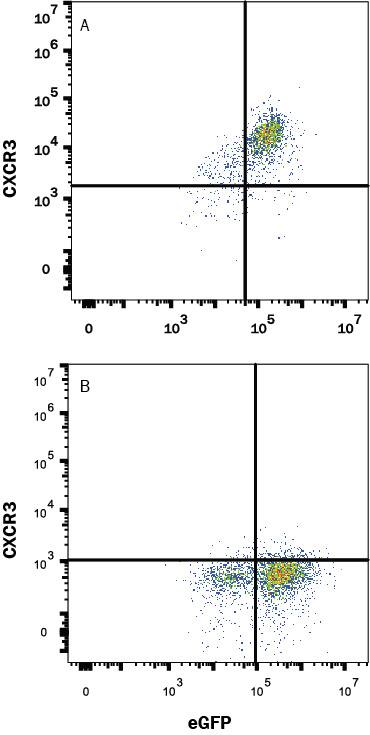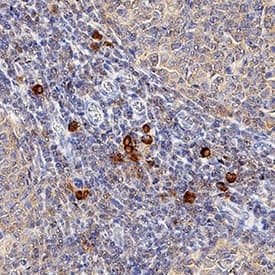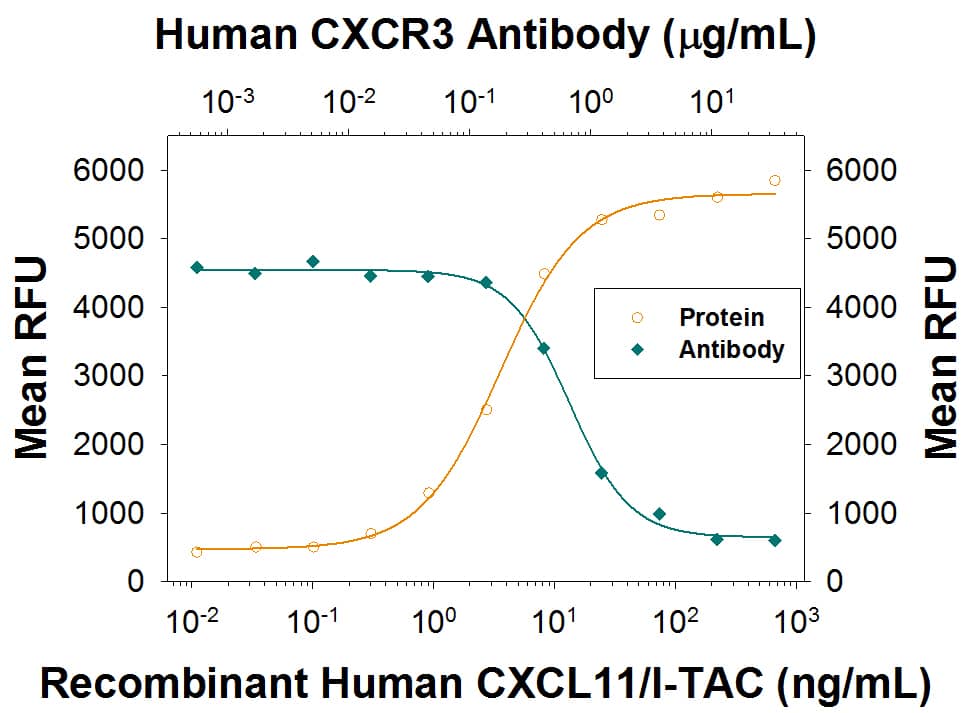Human CXCR3 Antibody
R&D Systems, part of Bio-Techne | Catalog # MAB160R
Recombinant Monoclonal Antibody.


Conjugate
Catalog #
Key Product Details
Species Reactivity
Human
Applications
CyTOF-ready, Flow Cytometry, Immunohistochemistry, Neutralization
Label
Unconjugated
Antibody Source
Recombinant Monoclonal Mouse IgG1 Clone # 49801R
Product Specifications
Immunogen
NS0 mouse myeloma cell line transfected with human CXCR3
Met1-Leu368
Accession # P49682
Met1-Leu368
Accession # P49682
Specificity
Detects human CXCR3 in direct ELISAs.
Clonality
Monoclonal
Host
Mouse
Isotype
IgG1
Endotoxin Level
<0.10 EU per 1 μg of the antibody by the LAL method.
Scientific Data Images for Human CXCR3 Antibody
Detection of CXCR3 in HEK293 Human Cell Line Transfected with human CXCR3 and eGFP by Flow Cytometry.
HEK293 human embryonic kidney cell line transfected with (A) human CXCR3 or (B) irrelevant transfectants and eGFP was stained with and either Mouse Anti-Human CXCR3 Monoclonal Antibody (Catalog # MAB160R) followed by APC-conjugated Anti-Mouse IgG Secondary Antibody (Catalog # F0101B). Quadrant markers were set based on Mouse IgG1 Flow Cytometry Isotype Control (Catalog # MAB002). View our protocol for Staining Membrane-associated Proteins.CXCR3 in Human Tonsil.
CXCR3 was detected in perfusion fixed paraffin-embedded sections of human tonsil using Mouse Anti-Human CXCR3 Monoclonal Antibody (Catalog # MAB160R) at 0.5 µg/mL for 1 hour at room temperature followed by incubation with the Anti-Mouse IgG VisUCyte™ HRP Polymer Antibody (Catalog # VC001). Tissue was stained using DAB (brown) and counterstained with hematoxylin (blue). Specific staining was localized to infiltrating lymphocytes. View our protocol for IHC Staining with VisUCyte HRP Polymer Detection Reagents.Chemotaxis Induced by CXCL11/I-TAC and Neutralization by Human CXCR3 Antibody.
Recombinant Human CXCL11/I-TAC (Catalog # 672-IT) chemoattracts the BaF3 mouse pro-B cell line transfected with human CXCR3 in a dose-dependent manner (orange line). The amount of cells that migrated through to the lower chemotaxis chamber was measured by Resazurin (Catalog # AR002). Chemotaxis elicited by Recombinant Human CXCL11/I-TAC (7 ng/mL) is neutralized (green line) by increasing concentrations of Mouse Anti-Human CXCR3 Monoclonal Antibody (Catalog # MAB160R). The ND50 is typically 0.3-1.5 µg/mL.Applications for Human CXCR3 Antibody
Application
Recommended Usage
CyTOF-ready
Ready to be labeled using established conjugation methods. No BSA or other carrier proteins that could interfere with conjugation.
Flow Cytometry
0.25 µg/106 cells
Sample: HEK293 Human Cell Line Transfected with human CXCR3 and eGFP
Sample: HEK293 Human Cell Line Transfected with human CXCR3 and eGFP
Immunohistochemistry
0.5-25 µg/mL
Sample:
Sample:
Perfusion fixed paraffin-embedded sections of human tonsil
Neutralization
Measured by its ability to neutralize CXCL11/I‑TAC-induced chemotaxis in the BaF3 mouse pro‑B cell line transfected with human CXCR3. The Neutralization Dose (ND50) is typically 0.3-1.5 µg/mL in the presence of 7 ng/mL Recombinant Human CXCL11/I‑TAC.
Formulation, Preparation, and Storage
Purification
Protein A or G purified from cell culture supernatant
Reconstitution
Reconstitute at 0.5 mg/mL in sterile PBS. For liquid material, refer to CoA for concentration.
Formulation
Lyophilized from a 0.2 μm filtered solution in PBS with Trehalose. *Small pack size (SP) is supplied either lyophilized or as a 0.2 µm filtered solution in PBS.
Shipping
Lyophilized product is shipped at ambient temperature. Liquid small pack size (-SP) is shipped with polar packs. Upon receipt, store immediately at the temperature recommended below.
Stability & Storage
Use a manual defrost freezer and avoid repeated freeze-thaw cycles.
- 12 months from date of receipt, -20 to -70 °C as supplied.
- 1 month, 2 to 8 °C under sterile conditions after reconstitution.
- 6 months, -20 to -70 °C under sterile conditions after reconstitution.
Background: CXCR3
CXCR3 is a G protein-coupled chemokine receptor that binds the alpha chemokines MIG (CXCL9), IP-10 (CXCL10), and I-TAC (CXCL11). CXCR3 is expressed on activated T cells, B cells, and NK cells.
Alternate Names
CD183, CXCR3, GPR9
Gene Symbol
CXCR3
UniProt
Additional CXCR3 Products
Product Documents for Human CXCR3 Antibody
Product Specific Notices for Human CXCR3 Antibody
For research use only
